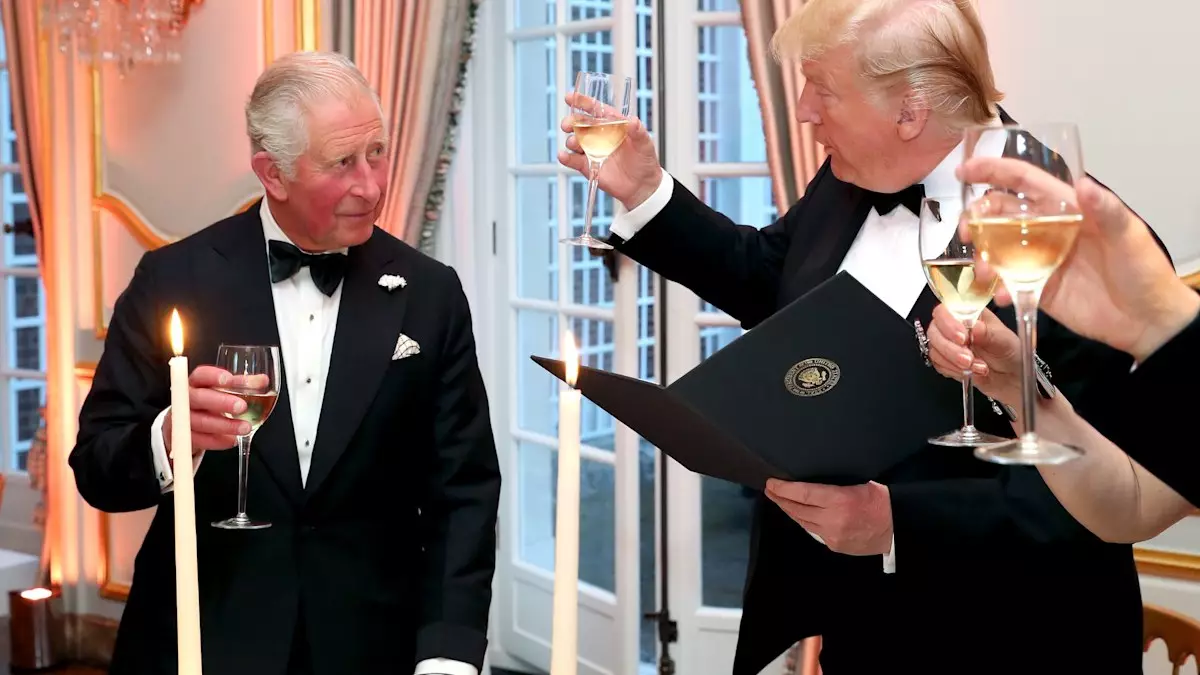The announcement of Donald Trump’s second state visit to Buckingham Palace in September marks a significant moment in diplomatic relations between the United States and the United Kingdom. His assertion, made during a recent Oval Office briefing, that he has been invited by King Charles III, signifies not just a ceremonial gathering but serves as a powerful statement illuminating a new chapter in U.S.-UK relations. The term “fest” used by Trump to describe the visit perhaps underscores his penchant for reflecting his personal touch on formalities, indicative of a broader trend he follows of mixing casual language with high-stakes diplomacy.
In a political climate characterized by polarization, the acknowledgment by leaders on both sides serves to bridge gaps that traditional state visits often aim to diminish. What’s particularly remarkable is that Trump’s invitation comes during a historic context where second-term presidents typically do not receive such high honors. The exception made for Trump resonates with nuances of friendship and shared personal relationships amid diplomatic protocols, suggesting that the ties formed during his first term continue to influence current relations.
Reinventions in the Royal Invitation
British Prime Minister Sir Keir Starmer’s role in this invitation notably highlights the evolving dynamics of leadership. Starmer’s delivery of the invitation during their meeting could be viewed as a calculated move to not only solidify the special relationship between the two nations but also to enhance his own political capital. By extending this invitation, Starmer showcases a willingness to embrace Trump’s style of leadership—an approach that, while divisive, often draws attention and sparks conversations.
Moreover, the nature of this visit elucidates the complexity of contemporary political relationships, offering a refreshing yet controversial outlook on international diplomacy. Starmer’s statement that this occurrence is “unprecedented” aligns with the intrinsic unpredictability that has characterized Trump’s political narrative, reflecting a departure from conventional politics. This is about more than just a visit; it’s a milestone that rebrands the notion of state visits in a modern context.
The Voices of a Strong Relationship
As Trump publicly shared his respect for King Charles and the royal family during a press briefing, it reflected a personal connection that could contribute to a more favorable dialogue during his visit. Trump’s admiration extends beyond mere pleasantries; it portrays a calculated effort to align with the British monarchy, removing some of the burdens of historical tensions. The warmth between Trump and Prince William, highlighted during their meet-up after the reopening of Notre Dame Cathedral in December 2024, further solidifies this connection.
The recounting of fond memories shared with the late Queen Elizabeth and his inquiries about family dynamics suggest Trump’s ability to humanize political relationships. This emotional intelligence serves a dual purpose—it personalizes diplomacy while simultaneously attracting an audience that may feel disconnected from standard political discourse. For Trump, this engagement with the royal family is a strategic move, enhancing his persona as a world leader who can connect on both political and personal levels.
Perceptions of Ceremonial Affairs
State visits, although traditionally seen as ceremonial, possess immense potential for fostering bilateral relationships. Trump’s previous visit to the UK in June 2019, marked by an official welcome from Queen Elizabeth and engagements with various members of the British royal family, established a foundation for future interactions. Yet, the optics of such visits often raise questions about their effectiveness in addressing pressing issues such as trade agreements, climate change, and global security.
In Trump’s case, the royal invitation could serve to soften criticism levied against his administration, potentially framing his government as one keen on collaboration rather than isolation. The invitation, while ceremonial in its essence, also embodies the nuances of political strategy, suggesting that personal rapport with allies is paramount to achieving wider global objectives.
Overall, Trump’s upcoming visit symbolizes more than just a rekindled diplomatic affair; it encapsulates the intersection of personal relationships and international relations in a changing world. The implications are layered and complex, promising an event that will be watched closely, not only for its display of royal pageantry but also for its potential impact on the future of U.S.-UK relations.

Leave a Reply